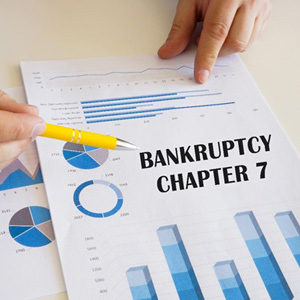
- Key aspects of qualifying for Chapter 7 bankruptcy
- The process and paperwork involved in a Chapter 7 bankruptcy filing
- How assets, student loans, and tax debt can be impacted during a Chapter 7 bankruptcy
Will I Qualify For Chapter 7 Bankruptcy? What Is The Chapter 7 Bankruptcy Means Test?
When determining if someone qualifies for a Chapter 7 bankruptcy, the first thing to assess is the client’s ability to pay his debts. Monthly income and expenses, as well as previous filings, play a role in this determination. It really isn’t complicated but since each person’s case is unique, it would be best to talk with a lawyer at Marks Law Firm. Our consultations are free. The Chapter 7 bankruptcy means test is applied if someone exceeds the median income for their family in the state they live in. Congress made the means test to help the courts decide if a higher wage earner should be granted Chapter 7 relief.
Could I Have Too Much Debt To Qualify For A Chapter 7 Bankruptcy?
No, there is no debt limit for Chapter 7 bankruptcy. Remember, one’s ability to qualify for a Chapter 7 bankruptcy is primarily based on monthly income and expenses.
What Is The Process Of A Chapter 7 Bankruptcy?
The process of a Chapter 7 bankruptcy is relatively simple:
- Meet with an attorney to prepare a bankruptcy petition.
- File the petition.
- Approximately 30 days after filing, attend a meeting of creditors (section 341 meeting).
- Receive a discharge 60 days after the 341 meeting.
What Paperwork Is Involved In A Chapter 7 Bankruptcy?
Clients typically need to provide pay stubs, bank statements, and the last two years of tax returns (if filed). Additional paperwork regarding creditors may also be required.
What About Filing Fees, And How Can I Afford To Pay For A Bankruptcy Attorney?
As of March 2023, the filing fees for Chapter 7 are $338. To afford bankruptcy filing fees and the help of an attorney, many clients often stop paying unsecured creditors or borrow money from family members. We do have some other suggestions based on certain facts for each individual.
What Is The Meeting Of Creditors In A Chapter 7 Bankruptcy?
The Meeting of Creditors, also called a 341 meeting, is a scheduled time when a debtor must be available for the Chapter 7 Trustee and creditors to ask questions. Chapter 7 trustees ask questions to ensure the case was prepared correctly. These meetings usually take 3-5 minutes and are now done telephonically in the Southern District of Iowa. Normally, creditors don’t bother to attend or participate.
Are There Exemptions Available In A Chapter 7 Bankruptcy That I Could Qualify For To Protect My Assets?
Yes, Iowa has some of the best exemptions in the country, often protecting most clients’ assets.
Can I Discharge Student Loan Or Tax Debt In A Chapter 7 Bankruptcy?
This is a complicated matter, and you should discuss it with an attorney since each case is unique. There are circumstances when student loans and taxes can be discharged.
Can I Protect My Retirement Account In A Chapter 7 Bankruptcy?
Yes, retirement accounts are completely protected under Iowa law.
How Long Does A Chapter 7 Bankruptcy Take?
A Chapter 7 bankruptcy typically takes around 90 days, though it can sometimes take longer.
For more information on Qualifying For A Chapter 7 Bankruptcy, a free initial consultation is your next best step. Get the information and legal answers you are seeking by calling (515) 276-7211 today.
I Offer Free Phone Consultations
(515) 276-7211